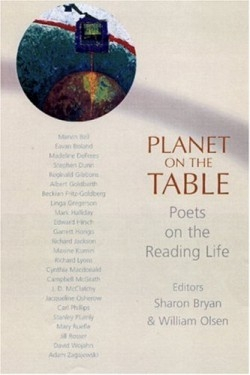Planet on the Table
Poets on the Reading Life
“It has been our experience that reading is … itself a creative act-mysterious and fluctuating, alternately baffled and rapt, questioned and questioning: like writing.” So the editors introduce this collection of essays on reading as writing’s “other side,” a topic they note as “unilluminated as the dark side of the moon” in existing literature. The collective voice of this book moves reading well into the light, in what the editors call “more than anything … love stories.”
Bryan, a poet and professor with two fellowships from the NEA to her credit, and Olsen, a widely published poet and professor at Western Michigan University and Vermont College, gathered impressions on reading from twenty-five poets, primarily professors of writing at universities across the United States. Each shares the impact that reading has, historically and presently, on his or her life as a writer, student, teacher, and citizen. The result is a personal, diverse, and emotional ode, from some of the finest poets writing and teaching today.
“I’m thinking of two or three poems, maybe more, and of the planet on the table of which they are a small part,” begins Stanley Plumly, Professor of English at the University of Maryland, College Park. In his planet’s “northern hemisphere,” it is every shade of autumn, his life and writing practice deeply informed by poems of the season by Keats, Yeats, Dickinson, and Whitman.
The essays move gracefully from the very specific to the equally abstract. Some poets, such as Maxine Kumin, offer lists of books, authors, and individual poems that have inspired them as writers and scholars of language. Others, like Robin Behn in the collection’s opening essay, discuss the genesis of their own writing practices in response to the important role of reading in their childhoods and beyond.
The theme of “reading to write,” and even, in some cases, to live, is consistent across essays of varying forms, lengths, and levels of academic complexity. “Read everything,” exhorts celebrated Polish poet Adam Zagajewski. “Read for the sake of your inspiration, for the sweet turmoil in your lovely head.” Albert Goldbarth, Professor of Humanities at Wichita State University, repeats, “Read everything… . I mean everything: the put-together instructions for a cheap toy from Taiwan; the whole of Dante … the out-of-print and in your face. The sacred. The slutty. Everything.”
An index of the works cited in each essay is a welcome addition. Academics and lay readers alike should welcome the illumination of reading achieved in this poetic and ultimately very satisfying collection.
Reviewed by
Laurie White
Disclosure: This article is not an endorsement, but a review. The publisher of this book provided free copies of the book to have their book reviewed by a professional reviewer. No fee was paid by the publisher for this review. Foreword Reviews only recommends books that we love. Foreword Magazine, Inc. is disclosing this in accordance with the Federal Trade Commission’s 16 CFR, Part 255.

